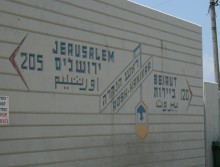
Lebanon remains volatile after the massive explosion that rocked the country’s capital city of Beirut last week, as protests and unrest continued inside the country and a drone invaded Israeli airspace at the border. On Sunday, protestors and rioters in Beirut angry about the explosion that killed more than 150 people and wounded thousands battled police for the second day in a row, according to a report from Lebanon’s The Daily Star. And Hezbollah hasn’t been spared that anger, even as the powerful terror group’s leader, Hassan Nasrallah, denies the blast was caused by weapons owned by the organization.
While Hezbollah is feeling pressure inside the country, Israel has been prepared for potential cross-border attacks from the terror group. On Friday last week, the IDF announced it had shot down a drone crossing the Israel-Lebanon border. “Last night, IDF troops identified, monitored, & downed a drone which infiltrated into northern Israel along the Blue Line. We are searching the area,” said a post on the IDF Twitter page. “The IDF continues to maintain a high level of readiness to defend Israel’s northern border from any threat.”
Hezbollah has so far not claimed credit for the drone. The incident comes as tensions between Israel and Hezbollah have been high following accusations Israel killed a Hezbollah operative in Syria and Hezbollah launched a failed terror attack against Israel in response.
Israeli Maj. Gen. (res.) Yaakov Amidror, an expert on Hezbollah with the Jewish Institute for National Security of America (JINSA) and the Jerusalem Institute for Strategy and Security, told The Mideast Update in an interview that in his view “the main issue is not the drone, it is the declaration of Hezbollah that they still owe us a retaliation and they are determined to act in spite of the situation in Lebanon.”
Amidror, a Distinguished Fellow for JINSA, said that it is a “huge mistake” from a logical perspective in the aftermath of the Beirut crisis for Hezbollah to risk instigating a fight with Israel by launching a revenge attack, “but this is the Middle East and logic is in many cases not the main argument… We cannot count on their smartness.”
Meanwhile the Beirut protests have at least partly targeted Hezbollah, who may have had weapons stored at the warehouses that exploded. A life-size cardboard cutout of Nasrallah was paraded with a noose around his neck, according to a picture appearing on a Twitter post on Saturday by writer and columnist Hussain Abdul-Hussain. A similar image of Nasrallah hanged in effigy was posted by Lt. Col. (res.) Avital Leibovich, the Israel Director of the American Jewish Committee and a former spokesperson for the IDF. Leibovich noted in her tweet: “Only when #Hezbollah will be expelled from #Lebanon , the country will have a chance to BEGIN recovery.”
In addition to venting anger at Hezbollah, the current Beirut protests have also targeted Iran, which funnels funds and weapons to Hezbollah in exchange for the group acting as Tehran’s terror proxy. Al Arabiya posted video on Saturday showing protestors chanting “Iran get out” at the Foreign Ministry in Lebanon, as well as video showing demonstrators rushing the Lebanese Foreign Ministry office and burning pictures of Lebanese President Michel Aoun inside the Foreign Ministry building.
The same Al Arabiya report quoted Nasrallah denying Hezbollah had been storing weapons or the explosive chemical ammonium nitrate in the Beirut port where the massive explosion occurred. Israeli journalist Ronen Bergman tweeted last Tuesday that there was “uncorroborated intel” that the warehouses had held missile parts for Hezbollah, according to a senior Israeli source. Bergman, who writes for Yedioth Ahronoth, noted in the Tweet about the claims: “If so – the incident may cause serious damage to Hezbollah and Nasrallah in Lebanon.”
Amidror, a former National Security Advisor of Israel, does not believe the protests will effect real change given Hezbollah’s military strength in the country, “with all due respect to all these demonstrators.” In his comments to The Mideast Update, Amidror said, “It’s not a democracy, and [the protestors] will cross something which would be shown as a red line with Hezbollah, then Hezbollah will kill them, as simple as that. There is no real group or force in Lebanon which is strong enough to compete with Hezbollah’s cruelty and ability to kill.”
Amidror was careful to note that nothing is truly impossible, but the likelihood of the protestors transforming Lebanon is “very close to impossible.”
Outside Lebanon, the United States, in addition to offering aid and condolences following the blast, has called for an independent investigation into the incident. “We join others in the call for a thorough and transparent investigation into the cause of this explosion,” said US Secretary of State Mike Pompeo in a State Department press release on Friday. “The Lebanese people deserve accountability and a government that prioritizes the safety and prosperity of its citizens.”
The European Union is also getting involved with aid and calling for an independent review into the explosion, as well as broader action to better the country.
“Local political forces should seize the opportunity and unite around a national effort to respond to the immediate needs but also more long term challenges the country is facing,” EU President Charles Michel was quoted in an EU press release as saying on Saturday following a visit to Beirut. “It’s of critical importance for Lebanon to implement the fundamental structural reforms. The Lebanese can count on the European Union in this effort—but internal unity is key.”
(By Joshua Spurlock, www.themideastupdate.com, August 9, 2020)
